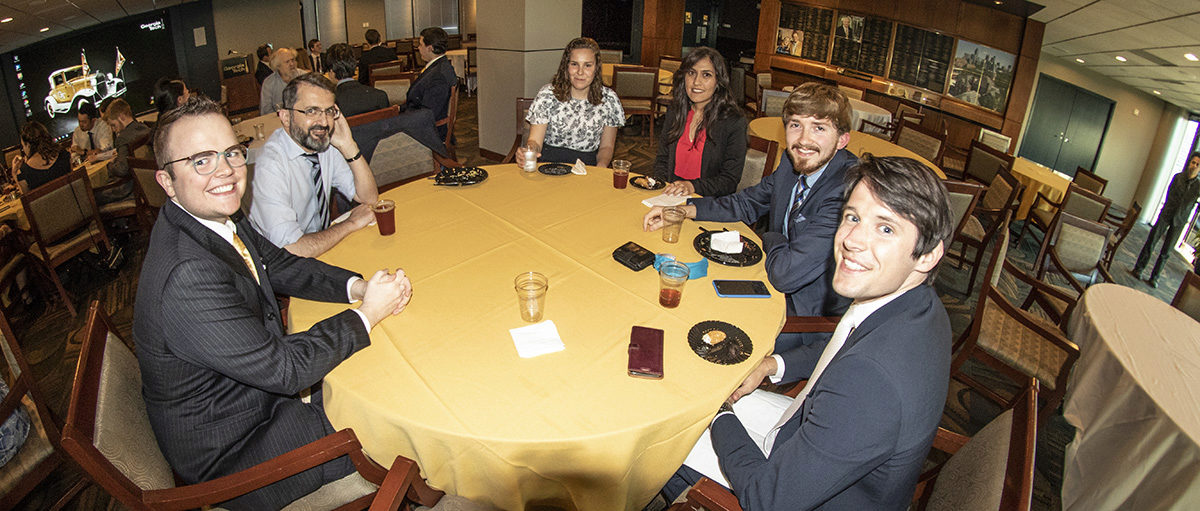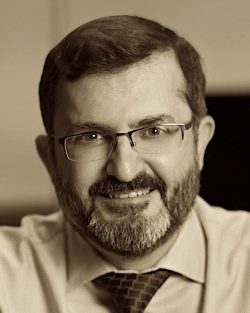 It's All About Learning. Prof. Joseph H. Saleh, second from the left, is seen here at the Sigma Gamma Tau Senior Banquet with some of the students who selected him as Professor of the Year.
It's All About Learning. Prof. Joseph H. Saleh, second from the left, is seen here at the Sigma Gamma Tau Senior Banquet with some of the students who selected him as Professor of the Year.
 |
| Joseph H. Saleh |
For the second time in as many years, the Georgia Tech chapter of Sigma Gamma Tau has named Joseph H. Saleh Professor of the Year in the School of Aerospace Engineering. Announcement of the honor came April 10, when soon-to-be graduates gathered for the Senior Banquet - an event that is normally abuzz with talk of finals, Capstone projects, and job offers.
The chatter was a little different this year.
"Dr. Saleh is a teaching god," proclaimed Calvin Phillips, one of several graduating seniors who competed to give commentary on the much-loved honoree.
"This man can take any subject and bring it to an easier level of understanding so all of the students can get the most out of it. I only wish I'd been able to take more classes with him."
Phillips was not alone in his passionate testimonial for Saleh.
"He is unlike any professor I've ever had," said Sigma Gamma Tau president Taylor Wentzel.
"I am always excited to go to his class because he's always excited about presenting the material. He starts every class with a story that puts the material in context. Maybe he'll play an opera while he's explaining. Even if the material is tough or not that exciting, he explains it with such passion that you walk away understanding it in a way that you won't forget."
Sigma Gamma Tau vice president Phil Clifton insisted on chiming in:
"A lot of professors are fun or relate to students, but what makes Dr. Saleh stand out is he is invested in his students. He unlocks the abilities that students need to be successful, and he won't stop trying if he thinks you may not understand something."
Sitting nearby, Saleh warmly acknowledged his students' praise, but bristled at anything that skewed too personal.
"This is not about me, personally, but about learning," he said. "Knowledge, like art, gains its value from being shared. It's not about knowledge that separates us and creates a power structure between me and the students. It's about an environment where instances of beauty can be experienced, shared, and created."
If anyone can back up such lofty goals with substance, it's Joseph Homer Saleh. Dissatisfied with the approach taken by most textbooks, he often delivers reading material to his students that is tailored to his own demanding standards. He gives students tough homework assignments, but also hands them the answers to that homework to remove any chance they will be hamstrung by incidental miscalculation.
"He knows you could turn in the answers that he already gave you but he also knows that students who care will want to learn - not cut corners," said Phillips. "And when it comes time for the finals, cheating won't help you."
But it's not the difficulty of Saleh's classes that draws students back. It's their liveliness. Throughout his tenure at Georgia Tech, he's sprinkled his teaching of very technical and demanding subjects with operas, symphonies, and stories that draw upon his rich experience as a researcher, academic, and pilot. Saleh says he sometimes gets goosebumps when he knows his students are connecting with his approach, but he is quick to point out that curating an effective learning environment demands a very deliberate and disciplined approach.
"For me, teaching is about establishing a balanced relationship between three entities: the student, myself, and the topic," he said.
"If it's all about that relationship with the student, you are losing some of what the subject has to offer. A good learning environment is a balancing act between the aesthetics of the topic, and the presence of others. I know that all of my students know some things that I do not, so I try to create an environment where we can share knowledge."
Saleh takes this last part very seriously. As each semester draws to a close, he offers students a chance to earn extra credit by presenting him with a lesson on a subject of their own choosing. These 'Teach the Teacher' sessions cover topics that are entirely defined by the students. Past lessons have included salsa dancing, finance, labor history, calligraphy, real estate, photography....
"I offer credit, but what I find is the ones who take me up on the Teach-the-Teacher are the ones who are already doing the best," Saleh has said, with the pride of a parent. "It's really a treat for me, to learn something that matters to them."
This perspective rings true for Dr. Joyce Weinsheimer, the director of Georgia Tech's Center for Teaching and Learning.
"One of my favorite quotes about teaching is from a book by Donald Finkel [in which he writes] 'Good teaching is the creating of those circumstances that lead to significant learning in others,'" Weinheimer said.
"There are many different ways for faculty to create such circumstances, whether they interact with students in classrooms or labs or in office hours. But whatever the setting, elements of good teaching involve respecting students as learners, helping them make sense of difficult concepts, and supporting them as they work to succeed. Students note when we pay attention to the puzzled looks on their faces, their reactions to what we are teaching, and their need to connect the content they were learning to the real world."
Weinsheimer said she was not surprised by the students' selection of Saleh for the 2019 - and 2018 - teaching awards. As the coordinator of the Thank A Teacher program, she's often heard directly from Saleh's students.
"Professor Saleh's students often comment on the circumstances he creates to promote their learning," Weinsheimer said. "They love the energy he brings to the classroom and the excitement he conveys about what he's teaching. They know that Dr. Saleh cares that they learn, and he makes sure that they have every opportunity to do so."
One of those students, Caroline Nannis, offered a written endorsement of her favorite professor:
"Because of my ADHD, focusing during lectures is extremely difficult, especially if I don’t find the subject material interesting. However, Dr. Saleh made lectures interactive and enthralling, and it was the one thing I looked forward to most throughout my week, so paying attention, which can be hopelessly impossible for me, was surprisingly easy. My only negative comment is that I couldn’t take dynamics with Dr. Saleh ...I hope to take Spaceflight Dynamics with him in the future."